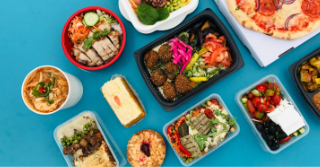As we move through March 2021, we look back at some of the most innovative ways restaurant owners have managed to keep their businesses open and prospering.
Selling meal plans/kits
One of the hardest parts of running a restaurant is managing food supply. It is a fine line of having enough ingredients to have your full menu available – but not so many ingredients that food waste due to spoilage consumes your bottom line. Many restaurant operators have mastered this by analyzing the habits of their customers. When COVID struck – all that went out the door. Suddenly there was no data that could help predict how busy your establishment would be on any given day or week – and eventually month. By setting up a meal plan or pre-selling meal kits, restaurants were better able to gauge how much inventory they would need. Example: I Ricchi Food Club
Dual roles for the same space
By joining forces with local non-profit and co-operative organizations, many restaurants have redefined their mission and their role in their local communities. As dining in options became restrictive many restaurant operators found they could not sustain their previous hours of operations – often closing their doors early or opening later – and in some cases shutting down certain days of the week. This provided restaurants a unique opportunity. By joining forces with local groups, restaurants were able to make use of their kitchens during non-operational hours as relief kitchens focused on feeding families in need. Example: World Central Kitchen - Restaurants for the People
Grocery/Artisan Food Sales
Several restaurants turned to selling groceries during the pandemic; however, a unique twist on this model was to also sell artisan and prepared foods from their menus. This allowed restaurants to continue to have a revenue stream and enabled them to keep at least a partial kitchen staff. In addition, it helped define them as a destination business due to the unique items for sale that could not be bought at established grocery chains.
No matter how your business has evolved during the last year, it is important to make sure your insurance keeps up with potential risks. Contact you Independent Insurance Agent to review changes to your business and how they might affect your coverage.



